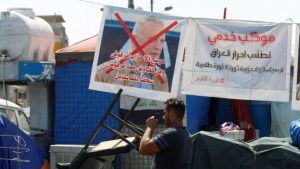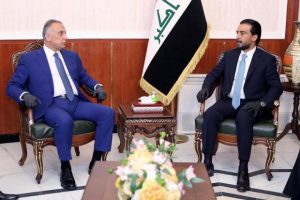08-05-2020
BAGHDAD: Iraq’s parliament has approved a new government, ending months of deadlock as the country battles an economic crisis and the coronavirus pandemic.
Former intelligence chief Mustafa al-Kadhimi, the third man to be nominated to replace Adel Abdul Mahdi since November, was sworn in as prime minister after Wednesday night’s vote.
“The security, stability and blossoming of Iraq is our path,” he tweeted.
However, Kadhimi will not start his term with a full cabinet.
Political factions are still negotiating over the candidates for the key ministries of oil and foreign affairs, while lawmakers rejected his picks for trade, justice, culture, agriculture and migration.
The US and the United Nations welcomed the formation of a new government, but urged Kadhimi to move swiftly to address Iraq’s problems.
Who is Mustafa al-Kadhimi?
The 53-year-old Shia Muslim is seen as a political independent and a pragmatist.
He is a former journalist who wrote against former President Saddam Hussein from exile in Iran and the UK before the US-led invasion of Iraq in 2003.
He served as head of Iraqi National Intelligence Service (Inis) from 2016 until last month, when he was tasked with forming a government. The two previous candidates, Mohammed Allawi and Adnan al-Zurfi, withdrew after failing to win enough support in parliament.
 Kadhimi was able to win the backing of the biggest political blocs, and was reportedly considered an acceptable choice by the US and neighboring Iran. But he still had to compromise on his list of proposed ministers several times.
Kadhimi was able to win the backing of the biggest political blocs, and was reportedly considered an acceptable choice by the US and neighboring Iran. But he still had to compromise on his list of proposed ministers several times.
What challenges does he face?
Kadhimi told lawmakers on Wednesday that his government “will provide solutions, not add to the crises” facing Iraq.
Before Covid-19 reached the country in March, thousands of people were taking to the streets of the capital, Baghdad, and many southern cities to express their anger at endemic corruption, high unemployment, dire public services and foreign interference.
More than 500 protesters were shot dead by security forces and unidentified gunmen during five months of unrest. Thousands of others were injured.
The protesters’ demands included sweeping away Iraq’s political system, which allocates positions to political parties based on ethnic and sectarian identity, encouraging patronage and corruption.
Kadhimi has pledged that his government will organize early elections and to hold those responsible for killing the protesters to account.
He must also deal with the Covid-19 pandemic, which has so far killed 102 Iraqis and the Iraqi healthcare system has limited capacity to contain, as well as the collapse in global oil prices and economic contraction that it has caused.
 Oil sales account for about 90% of government revenue, and Kadhimi faces a struggle to continue paying public sector wages. Officials in the caretaker administration were considering cuts to civil servants’ benefits and allowances.
Oil sales account for about 90% of government revenue, and Kadhimi faces a struggle to continue paying public sector wages. Officials in the caretaker administration were considering cuts to civil servants’ benefits and allowances.
The World Bank has projected that Iraq’s gross domestic product (GDP) will contract by 9.7% this year, the country’s worst annual performance since 2003.
The jihadist group Islamic State (IS) has also stepped up attacks, apparently seeking to take advantage of security forces being focused on the pandemic.
Iraq and the US will meanwhile launch a “strategic dialogue” next month to discuss relations that were strained severely in January by the killing of top Iranian general and an Iraqi militia commander in a US drone strike in Baghdad.
Iran retaliated by launching missiles at an Iraqi military base hosting US forces, and allied militias were accused of carrying out rocket attacks on other bases.
The Iraqi parliament voted to end the US troop presence following the drone strike, but the decision has yet to be implemented.
What was the reaction to the new government?
US Secretary of State Mike Pompeo welcomed the new government in a telephone call with Kadhimi and “discussed the urgent hard work ahead”, a state department statement said.
Pompeo also announced a 120-day extension for a waiver on US sanctions to allow Iraq to buy electricity from neighboring Iran as “a display of our desire to help provide the right conditions for success”.
In a statement, UN Special Representative Jeanine Hennis-Plasschaert urged Kadhimi to complete the formation of his cabinet, warning that he faced “an uphill battle” and there was “no time to spare”. (Int’l News Desk)
 Pressmediaofindia
Pressmediaofindia




